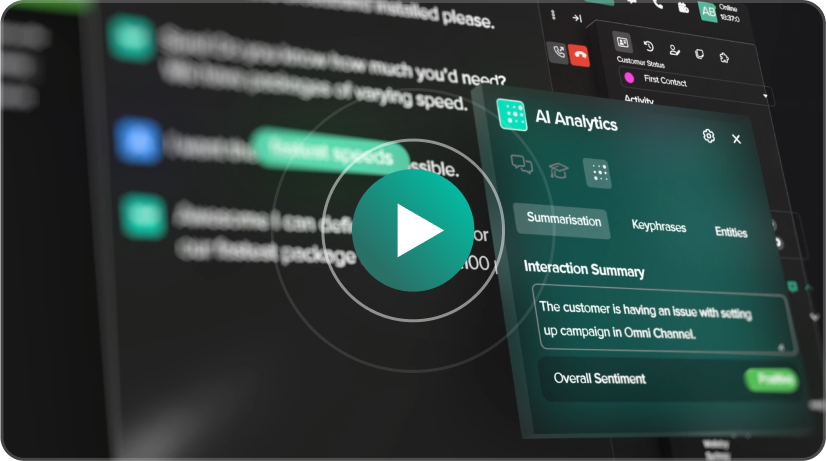5 Essential Features for a CXM Platform
Customer Experience Management (CXM) is the sum of all organizational efforts to deliver exceptional value and foster customer growth, encompassing the emotions and responses elicited by interacting with a branded product or service. CXM has become pivotal for businesses striving to attract and retain customers. In 2024, customers aren’t just buying products or services; they’re investing in the brand and the associated customer experience. Research by Forbes indicates that 74% of consumers make purchase decisions based solely on their experiences, and a study by American Express reveals that 86% of customers are willing to pay extra for an enhanced experience.
In a nutshell, quality Customer Experience is no longer a nice-to-have Consequently, CXM software platforms have become an essential part of how businesses interact with their customers. The decision of what CXM software platform to incorporate into your businesses processes is one of the most important choices you can make that will influence the path and success of your company.
In this article, we’ll explore 5 essential features you should look for when implementing a CXM software platform. But first, let’s get reminded of the basics: what is CXM and why does it matter?
What is CXM and why is it so important?
Customer Experience (CX) encompasses all organizational efforts to deliver exceptional value and foster customer growth, including the emotions and responses evoked by consuming a branded product or service. In today’s digital landscape, where customer opinions are widely shared, building emotional connections throughout their journey is paramount.
Prioritizing CX yields significant returns, with businesses focusing on CX tripling their revenue within a year, as reported by McKinsey. Studies indicate that 77% of brands view CX as a critical competitive advantage, while those investing in CX see an average revenue increase of $700 million within three years. Neglecting CX can be costly, with 89% of customers abandoning brands due to poor CX, according to Oracle.
Customer experience management refers to a collection of strategies aimed at cultivating brand-customer relationships. The objective is to enhance the customer journey at every phase—whether during purchases, customer support interactions, or engagements on social media—transforming every interaction into positive experiences CXM aims to enhance every customer touchpoint, fostering loyalty and brand affinity. By understanding these distinctions and embracing CXM, businesses can thrive in today’s customer-centric landscape.
In this sense, CXM is different from yet complimentary with CRM, or Customer Relationship Management. While CRM focuses on quantitative data to boost sales, CXM integrates qualitative feedback to establish emotional connections and foster customer loyalty. CXM is distinct from Customer Relationship Management (CRM) in that it prioritizes qualitative data and emphasizes emotional connections over sales.
Essential features for a CXM software platform
In the realm of CXM, Omnichannel communication stands as a transformative force for businesses, reshaping their customer interactions and driving overall success. By seamlessly integrating diverse communication channels like email, social media, live chat, and phone support, businesses can ensure a consistent and unified customer experience.
This not only enhances customer satisfaction and loyalty but also simplifies the entire customer engagement process. Modern Omnichannel software platforms offer intuitive interfaces that enable users to monitor all customer interactions across different channels, providing comprehensive insights into conversation statuses and customer details in a single interface.
Some CXM software platforms provide robust capabilities for tracking and analyzing customer behavior and sentiment comprehensively. By scrutinizing interactions between customers and agents, these platforms offer invaluable insights into customer behavior and staff performance. This knowledge aids in understanding how customers perceive the business, their preferences, and potential areas for improvement in strategies and operations.
Through aggregating data from various communication channels such as phone, email, social media, or SMS, businesses gain a deeper understanding of their strengths and areas needing improvement. Advanced tools like Sentiment Analysis AI can even discern customer emotions throughout conversations, providing critical information for strategy development and staff coaching within CXM frameworks.
Moreover, Customer Service AI tools such as Keyphrase Analysis, and Entity Recognition play pivotal roles in identifying trends and patterns. By harnessing these insights, businesses can make data-informed decisions aimed at enhancing operational efficiency and cost-effectiveness.
The incorporation of Conversational AI within Customer Experience Management (CXM) platforms offers a robust solution for businesses seeking to streamline operations and enhance customer interaction management. This technology excels in managing routine inquiries, automating responses, and directing customers to the appropriate resources, thus enabling human agents to concentrate on more complex interactions with higher value.
Industries facing substantial volumes of routine queries, such as e-commerce, customer support, and financial services, can significantly benefit from this technology. By assigning repetitive tasks to AI-driven systems and AI agents, businesses can achieve quicker response times, reduce operational costs, and elevate the overall customer experience.
This approach allows human agents to dedicate their attention to strategic and value-added activities. Whether it’s a small startup seeking cost-effective customer support or a large enterprise aiming to maximize efficiency and customer engagement, AI Conversational Bots prove indispensable for businesses pursuing these objectives.
Workflow Automation
Implementing workflow automation within Customer Experience Management (CXM) strategies can empower teams to achieve remarkable efficiency levels, leading to quicker, cost-effective processes and heightened customer satisfaction. Some CXM platforms equipped with workflow automation capabilities can streamline the entire customer interaction process, seamlessly linking various touchpoints in alignment with business and customer preferences.
Queries can be categorized and directed based on channel, skill requirements, language, or specific keywords. This automation proves especially advantageous for businesses handling high volumes of inquiries with diverse skill demands. By ensuring that each interaction is swiftly handled by the appropriate team, automation facilitates smooth, rapid, and productive conversations for both representatives and customers.
Furthermore, integrating AI Speech Analytics features into these workflows enables the categorization and routing of inquiries using advanced features such as Automatic Speech Recognition IVR or Keyphrase Analysis, enhancing the precision and efficiency of inquiry handling.
Your organization possesses a plethora of data sources beyond customer feedback, spanning from website analytics to CRM tools like Salesforce, and HR and finance data. These systems often provide APIs that facilitate seamless data transfer between different platforms.
Integrating your CRMs such as HubSpot and Salesforce with CXM platforms empowers you to delve deeper into your CX processes, providing clearer insights into areas for improvement and the impact of your CX strategies. This integration facilitates a more comprehensive understanding of customer interactions and enables more informed decision-making.
With over 40 integrations available, ConnexAI offers a robust combination of Omnichannel capabilities, AI analytics, workflow automation, and integration with leading CRM software platforms. This unified approach enhances efficiency and effectiveness in managing customer experiences, driving business growth and success.
If you enjoyed reading this, you might also be interested in…
Customer Interaction Management
Customer Interaction Management System
Call Center IVR
Customer Service AI
Conversational AI
Contact Center Artificial Intelligence
AI Agent
Omnichannel
Omnichannel Contact Center
CCaaS

